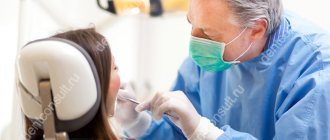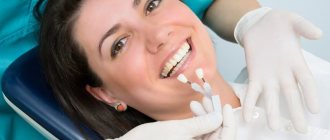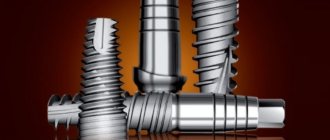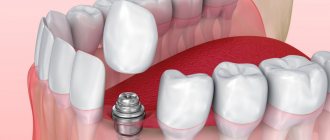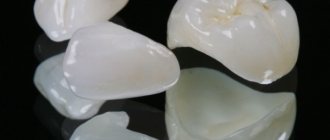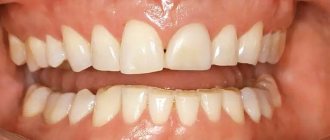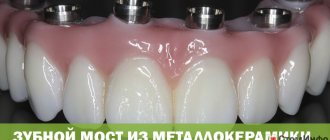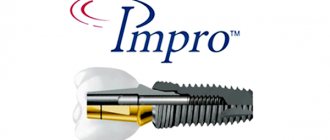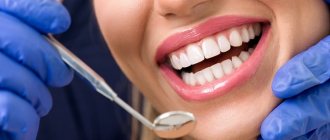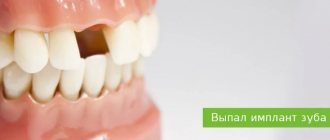January 17, 2020
If you are looking for good quality dental implants at a reasonable price, then look no further than SGS implants. Reviews from doctors and patients suggest that you can’t go wrong when choosing this brand. And the journalists from the UltraSmile.ru portal, as always, decided to check whether the information from the Internet corresponds to reality: in the article we will tell truthfully and in detail about the manufacturer, the cost of treatment, the advantages and disadvantages of the presented brand, and also present the opinion of real experts.
Brief summary about the manufacturer
SGS implants (“SGS”) are of noble European origin, manufactured in Switzerland, the Principality of Liechtenstein. They have been designed and produced by SGS Dental System Holding since 2007 - this is one of the youngest manufacturers in the global implantology market. They are created at high-tech production sites in Hungary and Germany. Moreover, most of the models are “born” in Hungary, which makes it possible to make the product more affordable for patients. But the final stage of production, quality control, is carried out at the DOT plant located in Germany.
Despite such a short period of existence and its youth, the company has received all the necessary quality certificates for its products from structures in the field of dentistry and healthcare - ISO, FDA, CE, NQA. The company has a worldwide developed distribution network, conducts training courses for implant surgeons, and is represented in 48 countries (Europe, Asia, America and Russia). It is noteworthy that the products of this holding entered the Russian market only in 2010-2011.
SGS Dental claims to provide its customers with the highest quality service, competitive pricing and the highest level of professional support1.
Reviews
The products of this manufacturer have been on the domestic dental implantation market for only a few years, so it is only possible to judge how durable they are so far only theoretically.
At the same time, their popularity among dentists and patients is constantly growing. And the company’s pricing policy is aimed at financial inclusion, which is very important for the Russian consumer with an average income level.
If you are interested in the systems discussed in this article, you can leave your comment in the appropriate section. Perhaps your opinion will help someone make the right choice.
If you find an error, please select a piece of text and press Ctrl+Enter.
SGS implant range
SGS implants are available in seven varieties, as well as different sizes and diameters, so that a professional doctor can find an approach to each clinical case.
Model P1 Premium
It is a screw design with an internal hex connection. Features dual aggressive threads for better primary stability. Suitable for installation immediately after tooth extraction and immediate loading with a prosthesis (but, of course, only under favorable clinical conditions). Available in diameters from 3.2 to 6.0 mm. The doctor can choose the right size according to length. Suitable for installation in dense bone tissue.
The photo shows the P1 Premium model
Model P7 Premium
This model, like the first presented, is available in the same sizes and diameters, has an internal hexagon for a tight connection to the abutment and is equipped with a sharp double thread. Suitable for immediate installation after tooth extraction and for immediate loading. However, unlike P1 Premium, it has a conical shape and is designed for self-screwing into the bone - these features facilitate the installation of the SGS P7 implant, make it minimally traumatic, and speed up the rehabilitation period. Suitable for fixation into bone of the third and fourth density types.
The photo shows the P7 Premium model
Model P7D
It has a conical shape that best matches the anatomy of the natural tooth root. Throughout the body of the P7D implant there are aggressive threads with a wide pitch, which achieves high primary stability of the artificial root in the jawbone. Can be used immediately after tooth extraction, suitable for any type of bone. Has an internal conical connection to the abutment.
Model pictured Model P7D
Model P1D
P1D is another representative of the SGS brand (Switzerland). This is a screw implant with a conical connection type and a moderately aggressive thread design. Suitable for implantation into hard jawbone types 1 and 2, promotes jawbone compaction at the time of placement and achieves excellent primary and subsequent stability. Suitable for immediate implantation with the possibility of immediate loading. Dimensions and diameters are the same as previous models.
This is what Model P1D looks like
Model P7N
These are narrow-conical artificial roots with a tapered end. Equipped with an internal cone connection and self-tapping thread for easy installation and secure fixation. Characterized by high stability even in atrophied bone tissue, they are suitable for highly aesthetic restorations in the area of the anterior units and in the presence of narrow, limited spaces.
This is what Model P7N looks like
P7N are suitable for single-stage and classic two-stage implantation protocols. In the case of single-stage protocols, they can be immediately loaded with a non-removable structure if high primary stability has been achieved. The manufacturer recommends using this line for soft bone tissue.
The model is presented in only two diameters: 3.0 and 3.2 mm. Standard length – up to 16 mm.
Model P9S
SGS implants are predominantly two-piece artificial roots, but P9S is one-piece or one-piece. The abutment here is already integrated into the implant, i.e. monolithic construction. Recommended for installation in a narrow alveolar ridge, when there is not enough space between the teeth. The model is available in diameters 2.4, 3.0 and 3.2 mm. The manufacturer positions it as a good solution for immediate implantation.
Pictured is Model P9S
Model P7S
Another monolithic structure designed to restore the incisors of the lower and upper jaw, as well as to solve the problem of partial edentia (implants can act as a support for bridge structures). Suitable for restoring teeth immediately after extraction, for immediate or early loading with a prosthesis.
Pictured is Model P7S
Design Features of SGS Products
SGS implants have a number of design features that their manufacturer is very proud of.
SBTC coverage
Implants of this brand have a unique patented SBTC coating. The abbreviation stands for “Smart Bioactive Trebecular Coating,” which translated into Russian means “smart bioactive trabecular coating.” In simple terms, SBTC is a bioactive calcium phosphate coating that is achieved through electrochemical processing.
Due to this spraying, the implant acquires a microstructure (fine crystalline, but not monolithic structure), which promotes the rapid growth and formation of bone tissue cells around it. Artificial roots with SBTC surface have the following advantages:
- take root in 98% of cases, according to studies conducted by the manufacturer,
- suitable for accelerated and immediate loading,
- biocompatible with the human body, do not cause signs of inflammation,
- not subject to oxidative processes,
- high safety of use,
- have increased primary and long-term stability,
- shorten the period of engraftment in the jaw bone: the coating is completely absorbed within 6-12 weeks after installation of the implant, it integrates into the bone tissue cells, ensuring their strong connection with the body of the artificial root.
Implants have a unique patented SBTC coating
Durable titanium alloy
All SGS brand implants are created from titanium alloy 6AL-4V, containing only minor impurities of aluminum (6%) and vanadium (4%). Compared to commercially pure titanium without impurities (for example, this is used to create the Straumann and Nobel brands), the 6AL-4V alloy slightly slows down the healing process of implants in the jawbone, and may cause an allergic reaction in some sensitive patients. But such an alloy makes it possible to reduce the cost of artificial roots and make them available to a wide range of consumers; moreover, it is very durable and wear-resistant.
Conical or hexagonal connection to abutment
All models presented by the company have either a conical or hexagonal connection with an abutment. These types of connections make it possible to ensure the stability and functionality of the entire system, eliminate the possibility of its depressurization, the likelihood of microshifts and the formation of cracks, and minimize the risks of bacteria penetrating inside and plaque accumulation, and the development of an infectious and inflammatory process. These types of connections allow you to correctly and evenly distribute the chewing load, providing daily comfort for the patient during the process of eating and chewing food.
Aggressive carving
Again, all SGS implants are equipped with this thread. Active self-tapping thread facilitates the easy installation of artificial roots, compacts the bone tissue around the implant body and ensures high primary stability of the entire system. Due to the presence of a wide pitch of thread turns, the area of contact between the bone tissue and the body of the implant increases, and the patient has the opportunity not to delay the installation of a permanent lightweight crown - it can be carried out in one stage according to the one-stage implantation protocol.
Active self-tapping threads facilitate easy installation process
SGS implants undergo a multi-stage sterilization process (complete removal of living harmful microorganisms), are treated with gamma radiation and are subject to constant laboratory monitoring. The company states that it takes full responsibility for this and guarantees their replacement if, after delivery, it turns out that their sterility has been compromised.
Alternative option
An equally famous Swiss company for the production of implants is Ihde Dental AG, which has existed since 1954. The main activity is the development and production of dental systems. A peculiarity of its marketing policy is that it does not advertise its products and does not sell them freely. It has been producing basal implants for over 50 years.
They are used for dental prosthetics, which is done within 3 days after the installation of implants. A license to install them is issued only to a dentist who has completed a training course at a special base. The company offers more than 350 types of dental products, which have the following advantages:
- products with special coatings that are resistant to food and chemical irritants;
- cheaper compared to others;
- very rarely these designs are rejected, there are no side effects;
- After tooth extraction, an implant can be placed immediately.
What quality guarantees are provided by GHS?
Representatives of the SGS Dental System Holding corporation provide the consumer with a lifetime quality guarantee, subject to compliance with treatment protocols and the use of implants in accordance with the instructions attached to them.
Company representatives admit that responsibility for the final result lies not only with the manufacturer of artificial roots, but also with the surgeon who performed the restoration of the teeth. Therefore, if you want all guarantees to be met, then look for a professional doctor who will thoroughly prepare for treatment and first eliminate all contraindications you have.
Choose a specialist responsibly
Certificates
Certificates are proof of the highest quality of the product and its compliance with international standards:
- CE mark - it guarantees the complete safety of the product;
- ISO and UNI EN ISO - confirm the compliance of all structural elements with the technical standards applied to them;
- FDA is a document guaranteeing sanitary quality control carried out by an independent American company of the same name.
Brand Disadvantages
The models of the presented brand solve simple clinical cases well and are suitable for single restorations, but they cannot be used to comprehensively restore teeth with fixed dentures according to one-stage implantation protocols, i.e. they are not suitable for solutions such as all-on-4, all-on-6, basal implantation.
The structures cannot be installed without first building up the bone tissue of the jaw, if you lost a tooth a long time ago, but were in no hurry to restore it - first you will have to go through osteoplastic surgery or sinus lift. They cannot be implanted in the presence of inflammatory processes in the jaw bone, in diabetes and osteoporosis, and they are not suitable for patients with periodontitis and periodontal disease.
The photo shows a diagram of the sinus lift operation
Despite their advantages, implants do not have a sufficient evidence base of research that would confirm the possibility of using them for life, because the company producing them has existed for no more than 12 years.
Stages of multiphase implantation
- First comes the diagnosis, as in the previous method.
- Next (under anesthesia) an operation is performed: cutting of soft tissues. With some implant models, a small puncture is sufficient.
- The bed is cleaned and prepared.
- The selected implant is inserted.
- Stitches are applied.
- After about six months, the supragingival part can be installed. This requires repeated surgery.
In both methods, a follow-up scan and examination are performed some time after the final procedures to ensure that everything is going according to plan. The list presented may differ from what you encounter. This is due to different clinical situations, techniques and different implant models. But we have listed the main points.
What the experts say
In fact, there are a lot of opinions among doctors regarding this brand.
Most professional doctors from Russia prefer to use in their practice more well-known brands, which have at least a twenty-year history of development and existence, and a large number of scientific publications. For example, among the Swiss ones it is definitely Straumann, which belongs to the premium brand. Or their budget Oneway Biomed. The listed brands are suitable for solving the most complex clinical cases that cannot be handled with SGS.
Such implants have a limited area of application
Some doctors also note: according to the stated characteristics and appearance, the roots of this brand resemble a brand from Israel – Alpha Bio. Or a not very good copy of it. Experts believe that SGS may be nothing more than a disguise of Israeli products as Swiss ones. Being called “Swiss”, implants inspire more confidence on the part of patients and specialists (after all, true Swiss brands are famous for their unsurpassed quality), and this also makes it possible to increase the cost of the product.
There are also experts who believe that the brand is gradually “growing”, and it is impossible to compare the products that the corporation produced in 2010-2011 with those that exist today - they are devoid of some of the shortcomings that spoiled its reputation earlier.
Such diverse opinions are associated with a lack of objective information about the brand in Russia, with too little history of its existence and with a small number of scientific publications about its quality and safety.
Notice
: Undefined variable: post_id in
/home/c/ch75405/public_html/wp-content/themes/UltraSmile/single-item.php
on line
45 Notice
: Undefined variable: full in
/home/c/ch75405/public_html/wp-content /themes/UltraSmile/single-item.php
on line
46
Rate this article:
implantation
- According to the official website sgs-dental.com
Comments
And what is the objective cost of implanting one tooth with these implants?
Alexey (01/29/2020 at 12:14 pm) Reply to comment
- Dear Alexey! The young SGS brand is positioned as a high Swiss quality product at the most affordable price. And indeed, its cost makes you pay attention - installing one implant will cost you about 20-25 thousand rubles. Fixing the crown can cost 35-40 thousand rubles.
Editorial staff of the portal UltraSmile.ru (02.02.2020 at 09:18) Reply to comment
Write your comment Cancel reply
Price
The cost of a product is determined by its parameters, manufacturing specifics and shape and, depending on the assortment group, amounts to:
| Design name | Average price in rubles |
| P1 | From 5 300 |
| P9S | From 5800 |
| P7 | From 4600 |
| P7S | From 5 900 |
Moreover, in some regions of the Russian Federation, the cost may be 10–12% higher than the indicated average limits. This is due to the transport costs of delivering the goods.
The video provides additional information on the topic of the article.
Stock
-27%
Teeth in 1 day on Straumann implants using ProArch technology!
300,000 rub. 220,000 rub.
get -17 %
Quadrotti dentures (without palate) 60,000 rub.
50,000 rub.
get -20 %
Manufacturing of removable denture Acry Free 40,000 rub.
32,000 rub.
get -40 %
Treatment of caries with a discount of 3000 rubles.
5000 rub. 3000 rub. get
